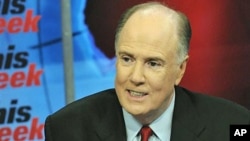Representatives of the Libyan Transitional National Council [TNC] met with President Barack Obama's national security advisor on Friday, as they continue to press for more aid in their fight against Libyan Leader Moammar Gadhafi. Libya also was a focus of talks that Obama had with NATO Secretary General Anders Fogh Rasmussen.
National Security Advisor Tom Donilon met with the rebel delegation headed by Dr. Mahmoud Jibril. The president did not drop in on the talks.
A White House statement said the meeting was aimed at continuing "the close consultations" about the situation in Libya.
The statement said Donilon reiterated that the United States views the TNC as a legitimate and credible interlocutor of the Libyan people, while stressing that Gadhafi has lost his legitimacy to rule and reiterated Obama’s call for him to leave immediately.
It said the two sides discussed "how the United States and the coalition can provide additional support to the TNC," and said Donilon applauded "the council's commitment to an inclusive political transition and a democratic future for Libya."
The U.S. has not formally recognized the TNC, with both the White House and State Department reiterating in recent days that doing so would be premature. But this first White House visit by representatives of the rebel council was nonetheless a significant step.
The Libyan rebel representatives did not come to the microphones outside the White House after the talks.
In remarks at the Brookings Institution on Thursday, Jibril pushed back at suggestions that the Transitional National Council is not fully representative of the aspirations of all Libyans, and said the stakes are high in Libya for the United States.
"There is a lot at stake strategically for the United States if that role is not played properly, there is a lot to be lost, you know," said Jibril.
The Transitional National Council representatives also went to the State Department, meeting with Deputy Secretary of State James Steinberg about the issues of recognition, and access to frozen Gadhafi assets.
Ali Tarhouni, the council's Minister of Finance and Oil, spoke to reporters after that meeting about rebel needs in ongoing battles with Gadhafi forces.
"My basic need now is food, medicine and fuel, but also if there is any country that is willing to arm us, we will be happy," said Tarhouni. "We are defending ourselves. This is the thug, the killer regime that took a peaceful movement and forced us to carry arms. So it’s legitimate that we have arms to defend ourselves."
Earlier, Obama discussed the status of NATO military operations in Libya in support of U.N. Security Council Resolution 1973, with NATO Secretary General Anders Fogh Rasmussen.
A White House statement said the two agreed that NATO efforts had "saved countless lives" and that as long as the government of Gadhafi continues to attack is own population, NATO will maintain its operations to protect civilians.
Rasmussen had this to say to reporters. "His time is up. It is time for the Libyan people to shape a new future, a future free from fear."
The president and Rasmussen also discussed Afghanistan, where the U.S. and NATO partners have a 2014 target for completing a transition of security responsibilities to Afghan government forces.
The White House statement said the two men agreed on the importance of a sustained NATO commitment to Afghanistan as the process of transition to Afghan security begins this year.
In recent White House news briefings, White House Press Secretary Jay Carney has stressed that Obama has not yet received a formal recommendation from his military commanders about the size of a U.S. troop drawdown scheduled to begin in July.
Libyan Rebels Meet White House Officials
- By Dan Robinson





